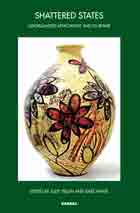Revenge: On the Dynamics of a Frightening Urge and its Taming

Book Details
- Publisher : Routledge
- Published : 2011
- Cover : Paperback
- Pages : 238
- Category :
Psychoanalysis - Category 2 :
Trauma and Violence - Catalogue No : 29887
- ISBN 13 : 9781855758278
- ISBN 10 : 185575827X
Also by Suzanne Kaplan
Our Customers Average Rating
Read all reviews (1)





The authors' aim in this book is to focus on revenge as a neglected and insufficiently understood psychological mechanism in a broad spectrum ranging from the many and varied revenge acts of everyday life to the extreme societal destructiveness of genocide.
Are perpetrators always avengers? What is the destructive potential of ordinary people? Envy, narcissistic wounds and rage are important themes with links to our forefathers. Human affects are central for attachment, symbolization and memory. How we deal with trauma will have an effect on the outcome of the revenge spiral. There are also grey areas between revenge and limit setting; what do these areas look like?
The authors develop models for horizontal and vertical relationships which are important for an open reflective mental space. Via the concept of "space creating" the book describes the creative space with its possibility for reflection. The dilemma of the professional helper, the consequences of listening to traumatic memories and revenge fantasies, so called "vicarious traumas" are also taken up. By the end of the book, the necessity of refraining from - and concrete ideas of what we can do to stop - revenge should have been made much clearer.
Reviews and Endorsements
'In this book, where revenge as a theme is described in all its expressions, there is a leitmotif that turns up all the time and is discussed in every context: the authors view revenge as a reaction against trauma, shame, denigration, loss, and similar feelings of low self value. The revenge is directed towards an avoidance of this experience, instead of acknowledging it and working it through. Therefore, Böhm and Kaplan never see revenge as a solution that can lead to real change and reconciliation, but instead it leads to a revenge spiral that will always play a part in the life of the victims. The authors discuss thoroughly how this principle expresses itself in real situations, in the playground, in couples' relationships, in sexuality, as a reaction against the Holocaust, in Rwanda, in former Yugoslavia, thus everywhere where revenge may play a part. Kaplan and Böhm show ways of how to further space for reflection, and what professional helpers can do, and also what they do, to help victims to reconciliate with traumas that may lead to revenge, to acknowledge and to survive without revenge. Thereby both authors use their research experiences and their own lengthy work with survivors from several genocides that recently have been added to our history. Although the book uses depth psychology it is not written only for professional people, and therefore it becomes an important source of information for everyone interested in this theme.'
- Marion Oliner, psychoanalyst, New York, USA
'All the collected phenomena on the theme of Revenge from many areas of research make this book into a mine of discovery for insights and differentiations. It is my wish that it will find many readers from the areas of psychotherapy, psychoanalysis, medicine, social work, education, penal law, and politics. It is also, however, suited for every interested person, because it is written in a very readable way, without simplifications.'
- Helmut Hinz, psychoanalyst, Tübingen, Germany
'This meritorius book, written by two experienced psychoanalysts, explains the mechanisms of revenge and shows ways to overcome it. It is written for everyone who wants to clarify the destructive power of revenge in the individual and in society. The overcoming of revenge is a prerequisite of the humanizing of humanity.'
- Werner G. Jeanrond, Professor of Divinity, University of Glasgow, UK
About the Author(s)
Tomas Böhm was a training psychoanalyst in private practice in Sweden, and author or co-author of a number of books dealing with xenophobia, racism and fundamentalism. He was a member of the International Psychoanalytical Association Prejudice Committee.
Suzanne Kaplanis a practicing child and training psychoanalyst. Researcher at The Hugo Valentin Centre, Uppsala University, Sweden. Publications include Children in Genocide - Extreme traumatization and affect regulation (2008). Recipient of the Hayman Prize for published work pertaining to traumatized children and adults in both 2001 and 2007.
Customer Reviews
Our customers have given this title an average rating of 5 out of 5 from 1 review(s), add your own review for this title.
Madeleine Sultán Sjöqvist on 29/02/2012 08:10:18




 (5 out of 5)
(5 out of 5)
Madeleine Sultán Sjöqvist
In Swedish: Hämnd eller Upprättelse - om hämndspiralens psykologi, Tomas Böhm and Suzanne Kaplan, Stockholm: Natur & Kultur (2006) 2009, second edition, first printing.
The complete English translation of the second edition, with further revisions, is Revenge - on the dynamics of a frightening urge and it taming, Tomas Böhm and Suzanne Kaplan, London: Karnac (2011).
A prominent feature of Tomas Böhm's and Suzanne Kaplan's is that they do not advocate forgiveness. We seldom see such a consistent therapeutic position. But it is precisely this insight that the afflicted need to meet. From such a perspective, those who have been forced to suffer cruelties are provided with a constructive opportunity to cope with their thoughts, feelings and actions. They can thereby avoid becoming a part of a revenge spiral, a spiral that tends to escalate.
Kaplan and Böhm published a book in Swedish on revenge and restoration in 2006 and the book now being reviewed is an expanded second edition published in 2009 and in English 2011. They show how revenge, as a psychological mechanism, is an active ingredient in everything from the "minor" pointers of everyday life such as the withholding of important information to more serious matters such as infidelity in couples' relationships and ranging upward to major societal phenomena such as war and genocide. Both Kaplan and Böhm have extensive experience of the psychology of revenge and restoration. She is a psychologist, a psychoanalyst and a writer and holds a PhD in education. Her thesis was based on work with children who have survived genocide. He is an MD, a psychoanalyst and writer and works with couples' relationships, xenophobia and the psychology of perpetrators.
One premise of the book is that all of us have the capacity to take revenge when our self-esteem is hurt and violated, but that most of us stop at revenge fantasies. We quite simply find ways out of destructive relationships, unsound workplaces and repressive situations. Similarly, most of us are capable of holding on to the insight that we harbour both good and evil within ourselves. The avenger, in contrast, has convinced himself beyond the shadow of a doubt that evil exits outside him. Evil is ascribed to the victim. The avenger sees no way of dealing with his own strong feelings other than to retaliate.
The key concept for Kaplan and Böhm is the revenge spiral. Based on a psychological understanding, they describe in the first part of the book how revenge and revenge spirals are expressed and function in practice. They take to polemics not least against the countless revenge themes that appear to play a major role in everything from literature and film to religion. Cultural history is rife with humans and gods who obliterate, retaliate and are totally close-minded - and who believe that they are triumphant - according to Kaplan and Böhm. The authors also use psychological theories to explain why people take revenge, harass others and show intolerance. I personally believe that most of us have asked ourselves these questions: Do I look the other way when I see bullying, harassment and vengeful actions? Do I get swept away by group pressure? Am I capable of actively participating in evil actions or of standing passively on the sidelines while I watch the group around me commit them? Or would I have the courage to stand up for the victim even if it cost me exclusion from the fellowship of the group? Kaplan and Böhm's answer cuts to the core: Most of us would give in to the pressure of the group. But we can learn to recognize and thereby expose the simplistic and cheap tricks that avengers and psychopaths use when they want to get a mob to join them. By doing so, we can be better equipped to resist the complicity and the moral failure of silent bystanders.
The second part of the book is about restoration, a part that could well have been expanded. I say this not least considering that we have in today's society greater opportunities for people to break away from destructive relationships, workplaces and regimes that carry out genocide. We need strategies to enable us to deal with neighbours, "friends", "colleagues" and "partners" who are caught in a destructive revenge spiral, people whom we in certain cases find in our daily lives. We frankly need not only to learn to recognize acts of revenge, narcissistic personalities and psychopaths, but also to be given examples of guidebooks from which we can learn to think and act in such a way as to prevent revenge from becoming a central part of our own lives. I hope the authors are working on a free-standing sequel where they give more details on how to proceed. More books on the psychology of civil courage are especially needed. What gives certain individuals the strength to stand up against a mob led by a psychopath though they risk their own well-being and comfort, yes, even their own life?
There is a profound seriousness about this book; the authors do not shy away from evil, cruelties and atrocities. It is a serious matter to force another human being to endure intolerance, revenge and genocide and it is a serious matter to have been dragged into a revenge spiral. Part of the book's strength is that the authors so clearly and consistently show that they side with the victims, with those who are the target of their fellow human beings' cruelty. The authors do not believe that forgiveness functions as a means of restoration, brilliantly stated on their part. No, life cannot go on as though nothing has happened. No, I cannot forgive you. No, I cannot relieve you of your guilt. You must bear it yourself. Restoration, according to the authors, can only be achieved between equals. Unless the perpetrator confronts his actions and changes radically, there is, quite bluntly, no basis for forgiveness. Kaplan and Böhm have reached the conclusion that perpetrators rarely have the capacity for transformation.
It is so easy to believe that restoration comes with retaliation, with giving the perpetrator a dose of his own medicine. Who can forget Don Corleones's statement of his life wisdom to one of his sons in The Godfather, "Keep your friends close but your enemies closer." History is rife with humans and gods who obliterate, retaliate and are totally close-minded - and who believe that they are triumphant. Now thanks to Kaplan and Böhm we can also see a path away from banalities.
Madeleine Sultán Sjöqvist
Lecturer in the Sociology of Religion
Researcher at Uppsala University
You may also like
Psychic Assaults and Frightened Clinicians: Countertransference in Forensic...
John Gordon
Price £37.99








